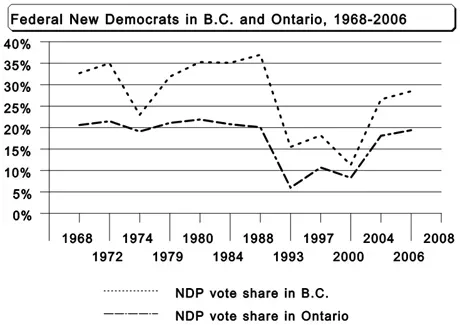The recent NDP election result has sent shockwaves through the political landscape of Canada, marking a significant downturn for the New Democratic Party and its leader, Jagmeet Singh. With a staggering reduction to just seven seats in the House of Commons, the implications of this outcome are profound. This drop from 25 seats in the 2021 elections signals a troubling trend, as they only managed to capture a mere six percent of the total votes. As the party faces this daunting reality, discussions about party leadership transition and the dire need to rebuild the NDP are becoming increasingly urgent among its members. With sentiments of betrayal lingering among supporters, the path ahead requires strategic planning and a renewed focus on regaining the trust of Canadians.
In the wake of the latest Canadian elections, the results for the NDP represent a momentous challenge that could redefine the party’s future. Jagmeet Singh’s leadership is now under scrutiny as party officials prepare for serious internal dialogues aimed at addressing the unexpected decline in representation. With the NDP only securing seven parliamentary seats, the need to reestablish a connection with voters has never been more critical. As discussions unfold about how to revitalize the New Democratic movement and restore faith among constituents, many are already looking towards potential new leadership options. This scenario sets the stage for a crucial period of reassessment and re-engagement in the New Democratic Party.
The Impact of the NDP Election Result on Party Dynamics
The recent NDP election result has left the party facing a daunting reality, with a significant reduction in their representation in the House of Commons. From a robust 25 seats in 2021 to a mere seven seats now, this dramatic downturn signals a critical juncture for the New Democratic Party and its leadership. As the party grapples with this setback, the open discussions among members about future strategies and directions are becoming increasingly urgent. MP Jenny Kwan aptly described the situation, acknowledging the heartfelt loss of her colleagues and underscoring the necessity of confronting the challenges head-on.
This shift not only impacts the internal dynamics of the NDP but also raises questions about their relevance in the Canadian political landscape. With merely six percent of the popular vote, the party risks losing its official status, which carries implications for funding, support, and visibility. This election result calls for profound self-examination within the NDP as they seek to reclaim the trust of their constituents. The departure of strong leaders may serve as a wake-up call, illuminating the need for a robust strategy that reassures Canadians of their commitment to social justice and progressive ideals.
Jagmeet Singh’s Resignation: Analyzing Leadership Challenges
Jagmeet Singh’s resignation following the election outcome resonates deeply with both party members and supporters. Acknowledging the disappointing results, Singh’s decision reflects the weight of voter discontent, particularly concerning the party’s alignment with the Liberal government. His leadership faced scrutiny as Canadians expressed feelings of betrayal, signaling a potential disconnect between NDP policies and constituent expectations. The immediate challenge now lies in navigating this turbulent transition in leadership while addressing the critical need for change to rebuild the party’s image and deepen its connection with voters.
The focus on potential new leadership figures, such as Ruth Ellen Brosseau or Valérie Plante, suggests a willingness within the party to explore fresh ideas and directions. This openness may provide the NDP with a path to rejuvenate its identity and regain a stronger footing in the Canadian elections. However, the transition also emphasizes the importance of sustaining the party’s core values while innovating strategies that resonate with a broader electorate. As the NDP contemplates its future, the discussions concerning leadership will undoubtedly play a significant role in shaping the trajectory of the party moving forward.
Rebuilding the NDP: Strategies for Regaining Voter Trust
In the aftermath of the NDP election result, the emphasis on rebuilding the party is pivotal in renewing public trust. With sentiments of betrayal echoing among voters, as pointed out by MP Kwan, the need for transparency and authenticity is more crucial than ever. Engaging with constituents on the ground and highlighting a commitment to community issues will serve as vital strategies in the rebuilding process. Voters seek to align with a party that genuinely understands and addresses their concerns; hence, local involvement and grassroots campaigning can significantly enhance the NDP’s prospects.
Moreover, the NDP must define a clear narrative that encapsulates its mission and vision moving forward. By addressing how their platform aligns with Canadians’ evolving needs, the party can successfully pivot from a wounded position to one of renewed vigor. Encouraging constructive dialogue within the party about policy priorities and exploring innovative approaches can create a refreshed mandate that resonates more effectively with voters. Rebuilding the NDP is not merely about recuperating lost seats; it is about fostering a movement that Canadians can believe in once again.
Understanding the Shift in Canadian Voter Sentiment
The recent decline in support for the NDP reveals a significant shift in Canadian voter sentiment. Factors influencing this trend include the perceptions of how well the NDP represents the progressive ideals that many Canadians value. As highlighted by Kwan, the party’s previous support for the Liberal government has left a bitter taste for some constituents, suggesting that strategic alignment is crucial in election preparation. Analyzing voter motivations and experiences provides essential insights into how parties must evolve to reflect the changing political landscape.
Furthermore, external political dynamics, such as growing concerns surrounding U.S. political influence, have spurred some voters towards options they perceive as stronger or more stable, which in this case has been the Liberals and Conservatives. The NDP must not only communicate its distinct vision but also engage actively with public anxieties to position itself as a trustworthy alternative. By comprehensively understanding these shifts, the NDP can devise strategies that bolster its appeal to Canadians during the next wave of elections.
Navigating the Future of the NDP: Essential Conversations Ahead
In response to the recent election results, it is clear that the NDP faces a series of essential conversations that must be navigated with care. As discussed among party members, these dialogues will revolve around the path forward and potential course corrections needed to reconnect with voters. There is a sense of urgency in addressing internal disagreements and defining a collective vision for the party, which is crucial for restoring faith among its supporters. The foundational issues that Kwan and Gazan identify, such as the party’s stance on key policies and alliances, will need thorough examination to see how they align with broader Canadian sentiments.
Moreover, these discussions should also encapsulate rejuvenating the party’s goals and strategies. Engaging grassroots members in this process could yield beneficial outcomes, fostering a sense of ownership and direction that emerges from the base. As they explore various leadership possibilities and strategic initiatives, the NDP stands at a crossroads where collaborative engagement can bring innovative ideas to the forefront. The goal is to reestablish the NDP as a compelling voice that advocates for the needs of all Canadians.
The Role of New Democratic Party Advocacy in the Community
The NDP’s commitment to community advocacy has historically differentiated it from other political parties in Canada. With recent election challenges, the importance of emphasizing community-level initiatives cannot be understated. Engaging with local issues and being responsive to the unique needs of constituents is essential for the NDP to rebound from the recent electoral setback. By focusing on grassroots movements and community-driven projects, the NDP can harness the motivation and involvement of everyday Canadians, providing them a tangible reason to support the party.
Addressing local concerns fosters a deeper connection between the party and its supporters, creating opportunities for meaningful dialogue about the party’s policies and their impacts. Investing in local advocacy not only helps regain trust but also becomes a foundational element of the NDP’s strategy to rebuild. As the party contemplates its future direction, it’s vital that a strong emphasis is placed on community engagement to demonstrate the value of the NDP’s vision and collective action for social change.
Lessons from the Recent NDP Performance
The recent performance of the NDP represents more than just a number of seats lost; it embodies critical lessons for the party about electoral strategy and voter engagement. The decline in voter support signals a disconnect that demands introspection and a re-evaluation of the party’s approach to national issues. A concerted focus on understanding what led to this downturn will be paramount for the NDP as they reassess their strategy for the upcoming elections and seek to solidify their position within Canadian politics.
Additionally, analyzing the NDP’s messaging and policy focus during the election can offer insights into both strengths and weaknesses. Initiatives that resonated with voters need to be built upon, while areas of discontent must be addressed head-on. This analysis can guide the party in refining its communications and enhancing awareness of their core principles among Canadians. Learning from this recent performance is not just critical for survival but also for revitalizing the NDP’s brand and ensuring it remains a relevant, progressive voice in the future.
Engaging New Leadership to Inspire Change in the NDP
As the NDP stands at a defining moment, the call for new leadership emerges as a vital aspect of the party’s rejuvenation efforts. The idea of selecting fresh faces, like potential candidates Ruth Ellen Brosseau and Valérie Plante, highlights a strategic pivot towards inspiration and rejuvenation. These leaders could bring new perspectives and energy to the NDP, encouraging younger generations to engage with the party. Highlighting diverse experiences and backgrounds within leadership not only fosters inclusivity but also reflects the changing demographics of Canada’s electorate.
Engaging new leadership will require strategic planning and a collaborative approach that resonates with voters. It will be essential for emerging leaders to not only advocate for the party’s core values but to also innovate approaches that tackle modern challenges faced by Canadians today. As the NDP concludes its reflection on recent results, establishing a leadership team that embodies resilience and vision will be paramount in its efforts to inspire change, rally support, and redefine its impact across communities.
Building a Stronger Future: The NDP’s Path to Revival
The NDP’s path to revival hinges on a series of tactical steps that must be seamlessly integrated into its revival strategy. Central to this undertaking is engendering a culture of transparency and accountability within the party. Voters are increasingly cognizant of their moral standing and have little interaction with politicians who do not align with their values. Thus, prioritizing operational integrity and community involvement will help fortify the NDP’s standing and effectively address voter concerns.
In aligning with these strategies, the NDP can craft a message of hope that speaks to the desires of Canadians. Rebuilding trust is a journey that will necessitate time, but also the collective effort of dedicated party members who believe in the NDP’s mission. The upcoming dialogue and strategic planning sessions will be critical for defining their future vision, enabling the NDP to not just recover from its recent past but to bloom into a potent force for positive change in the political arena.
Frequently Asked Questions
What were the key factors behind the NDP election result in the recent Canadian elections?
The NDP election result was marked by a significant decline in voter support, dropping to just over six percent of the vote and winning only seven seats. This decline can be attributed to various factors, including voters feeling betrayed by the party’s alignment with the Liberal government, as well as external influences such as concerns about U.S. political shifts that pushed voters towards the Liberals or Conservatives.
How will Jagmeet Singh’s resignation affect the future of the NDP after the election result?
Jagmeet Singh’s resignation following the NDP election result initiates a period of critical reflection and potential leadership transition. His acknowledgment of voter dissatisfaction indicates a need for a new direction, as the party seeks to rebuild and regain trust among Canadians. This transition could involve new leadership candidates and a reevaluation of the party’s strategies moving forward.
What actions are NDP leaders planning to address the devastating election result?
In response to the devastating election result, NDP leaders such as Jenny Kwan and Leah Gazan have indicated that the party will engage in ‘difficult discussions’ to chart a path forward. They emphasize the importance of rebuilding the party from the ground up, with discussions about leadership roles and strategies to reconnect with voters being paramount.
What is the significance of the NDP’s election result for party status in Parliament?
The NDP’s election result, which resulted in only seven seats and a drop below the required threshold, means they are set to lose official party status in Parliament. This loss has significant implications, including diminished resources and reduced speaking opportunities, further complicating the party’s ability to influence legislation and engage with Canadians effectively.
Who are potential candidates to lead the NDP in rebuilding efforts after the election result?
Following the NDP election result, potential candidates to lead the party’s rebuilding efforts include former MP Ruth Ellen Brosseau and outgoing Montreal Mayor Valérie Plante. These leaders are seen as vital for fostering a renewed NDP movement and reestablishing connections with Canadian voters disillusioned by recent party decisions.
What strategies might the NDP adopt to regain trust from Canadians after the election setback?
To regain trust from Canadians after the election setback, the NDP may focus on grassroots engagement, rebuilding community connections, and addressing the issues that led to voter disillusionment. This includes reflecting on past actions, ensuring transparency in decision-making, and engaging in public dialogues about the party’s vision and direction moving forward.
How has the recent election result influenced the NDP’s leadership dynamics?
The recent NDP election result has significantly influenced the party’s leadership dynamics, leading to Jagmeet Singh’s resignation and prompting discussions among other MPs about potential new leaders willing to shape a different future for the party. The necessity for a leadership change adds urgency to the conversations about revamping the party’s strategy and vision to reconnect with Canadian voters.
| Key Points |
|---|
| NDP reduced to 7 seats in House of Commons |
| Major decline from 2021 result (25 seats, 17.8% vote share) |
| Current vote share around 6%, risking loss of party status |
| Leader Jagmeet Singh resigned after the results |
| MPs acknowledge need for difficult discussions about future |
| Discontent over NDP’s support of Liberal government cited |
| Potential leadership candidates mentioned for party rebuilding |
| Commitment to party loyalty expressed by remaining MPs |
Summary
The NDP election result marks a significant downturn for the party, reducing their representation in the House of Commons to just seven seats. This outcome necessitates crucial conversations within the party to address the factors leading to their diminished support. As they reflect on their strategies and direction, the leadership transition following Jagmeet Singh’s resignation presents an important opportunity for renewal. The NDP must reconnect with its base and regain the trust of Canadians to rebuild effectively.



